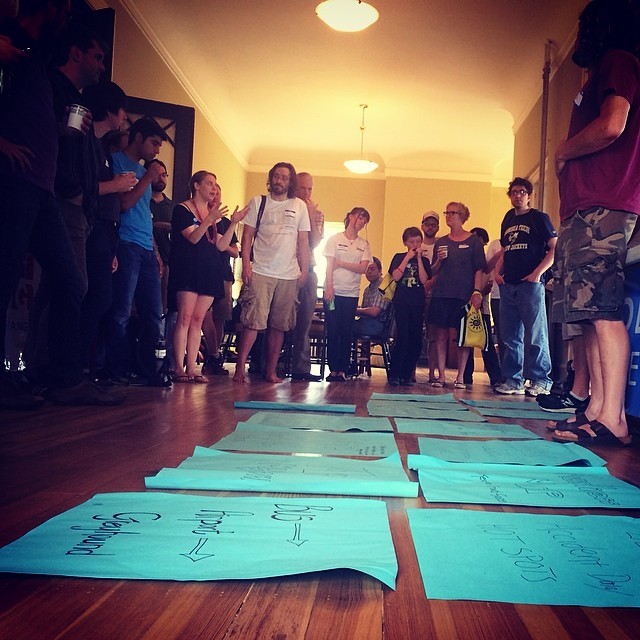Office of Science and Technology Policy Blog
Engaging First-Year Students in STEM Research
Posted by on May 12, 2015 at 3:19 PM ESTInvesting in science, technology, engineering, and mathematics (STEM) education is critical to the Nation and its future. Projections indicate that by 2022, there will be 1 million fewer STEM college graduates than U.S. industries will need. We also rely on students and workers trained in STEM disciplines to address complex challenges now and in the future across areas as diverse as the environment, human health and wellbeing, and national security. One way to simultaneously train a robust STEM workforce and to tackle pressing science and technology issues is to provide undergraduate students with opportunities to perform authentic research early in their college careers.
Learn more aboutSave the Date…the National Day of Civic Hacking is Coming June 6!
Posted by on May 12, 2015 at 11:02 AM ESTI’m excited to let you know about the third annual National Day of Civic Hacking, coming June 6, 2015, to a city near you! It’s a day when we’ll collaboratively build new solutions using publicly-released data, technology, and design processes to improve our communities and the governments that serve them. Anyone can participate…you don’t have to be an expert in technology; you just have to care about your neighborhood and community.
Lots of communities have existing frameworks for civic hacking events: events that provide opportunities for anyone who’s interested to collaborate to create services, apps, and websites that address social and civic issues that run the gamut from the environment to public accessibility to transit and housing. The National Day of Civic Hacking is a chance to connect and lift up these efforts to acknowledge the incredible impact that community collaboration, engagement, and volunteerism can have in our towns and cities.

Participants gather at a civic hacking event in Asheville, NC last year. (Photo credit: Nick Skytland/NASA).
I have to admit: this is one of those events that I just love. It brings together thousands of technologists, entrepreneurs, developers, designers, makers, organizers, scientists, and other citizens to improve their communities and the governments that represent them.
Learn more about , , TechnologyTwo Years of Transformative Open Data for Public Good
Posted by on May 11, 2015 at 3:28 PM ESTTwo years ago, President Obama signed an Executive Order (E.O.) to improve how our government shares information for the benefit of the American people. The E.O. meant that for the first time in history, Federal government data was required to be open by default with common standards and machine-readable formats. As a result, government information is now more easily discoverable with the necessary safeguards to prevent release of sensitive and personally identifiable information.
Data is a vital national resource, empowering Americans to fuel entrepreneurship, innovation, scientific discovery, and economic growth throughout all 50 states. Through implementation of the Open Data Policy and U.S. Open Data Action Plan, today’s Federal government serves as an engine to expand economic growth and opportunity for all Americans through the release of government data. Moreover, since information about government operations is more readily available, this data helps create a more efficient and transparent government.
Learn more aboutThe White House Names Dr. Ed Felten as Deputy U.S. Chief Technology Officer
Posted by on May 11, 2015 at 1:00 PM ESTWe are excited to announce that Dr. Ed Felten is joining the White House Office of Science and Technology Policy as Deputy U.S. Chief Technology Officer. Ed joins a growing number of techies at the White House working to further President Obama’s vision to ensure policy decisions are informed by our best understanding of state-of-the-art technology and innovation, to quickly and efficiently deliver great services for the American people, and to broaden and deepen the American people’s engagement with their government.
Ed’s expertise in the intersection of public affairs and computer science has led him to experiences in government, academia, and advising. Currently, he serves as the Robert E. Kahn Professor of Computer Science and Public Affairs at Princeton University, where he is also the founding Director of the Center for Information Technology Policy. Before rejoining the Princeton faculty, Ed served as the first Chief Technologist at the U.S. Federal Trade Commission, and worked with the U.S. Department of Justice Antitrust Division.
Learn more about TechnologyEnsuring Students have Equal Access to STEM Courses
Posted by on May 8, 2015 at 2:15 PM ESTLast week, President Obama met with young students at the Anacostia Neighborhood Public Library, and discussed the importance of education to their lives and to America’s future. One key theme that the President stressed was making sure that all students—regardless of sex—are able to pursue the careers they want, especially in growing fields of science, technology, engineering, and math (STEM).
As the President said:
“…And particularly for the young ladies here, I want you guys to make sure that you look at math and science, because sometimes young women aren't going into some of those areas like math and science as much, and they should. It's not because they don't know how to do it; it's because sometimes they’re discouraged, the idea being that somehow that's traditionally more of a boy thing. And that's something that we've got to get rid of.”
One priority of this Administration is to make sure we are doing everything we can broaden participation in STEM. That’s why the Administration’s Race to the Top competition focused not only on encouraging states to develop comprehensive strategies to improve achievement and provide rigorous curricula in STEM subjects, but also to broaden the participation of women and girls. The Administration has also focused on supporting more role models of women in STEM, from events like the White House Science Fair, which had the most girls ever this year, to the women in STEM series.
Learn more about EducationPublic Sector Prizes and Challenges Show Increased Sophistication, Ambition and Use: A Fiscal Year 2014 Progress Report
Posted by on May 8, 2015 at 10:56 AM ESTToday, the President is delivering the commencement address to the 2015 graduating class of Lake Area Technical Institute in Watertown, South Dakota. Lake Area Technical Institute is one of the top community colleges in the nation, and is recognized for rigorously preparing its students with the skills they need to compete in the 21st Century economy. With a two-year graduation rate more than twice the national average, Lake Area Technical Institute focuses on providing its graduates smooth pathways to high skilled careers with private-sector businesses. Lake Area Tech is one of only two community colleges in the nation that has been a finalist every year that the Aspen Prize for Community College Excellence has been awarded. The Aspen Prize for Community College Excellence is an outstanding example of cross-sector prize competitions being used to address tough social challenges, such as education. It is a prime example of the increased sophistication and use of prize competitions in the public sector.
Today, OSTP also released its fourth annual comprehensive report detailing the use of prize competitions and challenges by Federal agencies to spur innovation, engage citizen solvers, address tough problems, and advance their core missions. This report details the remarkable results from 97 prize competitions and challenges offered by 30 agencies under a variety of authorities in FY 2014 as required by Section 105 of the America COMPETES Reauthorization Act of 2010 (COMPETES) added Section 24 (Prize Competitions) to the Stevenson-Wydler Technology Innovation Act of 1980 (Stevenson-Wydler). This report echoes the practice illustrated by the Aspen Prize for Community College Excellence: a trend towards increased sophistication and use of prize competitions and challenges in the public sector.
Over the past six years, the Obama Administration has taken important steps to make prize competitions and challenges a standard tool for open innovation in every Federal agency’s toolbox. The September 2009 Strategy for American Innovation recognized the potential for prizes to mobilize America’s ingenuity to solve some of the Nation’s most pressing challenges. In March 2010, the Office of Management and Budget (OMB) issued a formal policy framework to guide agency leaders in using prizes to advance their core missions. In September 2010, the Administration launched Challenge.gov, a one-stop shop where entrepreneurs and citizen solvers can find public-sector prize competitions and challenges. As of May 2015, Challenge.gov had featured more than 400 prize competitions and challenges from over 72 Federal agencies, departments, and bureaus.
- &lsaquo previous
- …
- 6
- 7
- 8
- 9
- 10
- 11
- 12
- 13
- 14
- …
- next &rsaquo
White House Blogs
- The White House Blog
- Middle Class Task Force
- Council of Economic Advisers
- Council on Environmental Quality
- Council on Women and Girls
- Office of Intergovernmental Affairs
- Office of Management and Budget
- Office of Public Engagement
- Office of Science & Tech Policy
- Office of Urban Affairs
- Open Government
- Faith and Neighborhood Partnerships
- Social Innovation and Civic Participation
- US Trade Representative
- Office National Drug Control Policy
categories
- AIDS Policy
- Alaska
- Blueprint for an America Built to Last
- Budget
- Civil Rights
- Defense
- Disabilities
- Economy
- Education
- Energy and Environment
- Equal Pay
- Ethics
- Faith Based
- Fiscal Responsibility
- Foreign Policy
- Grab Bag
- Health Care
- Homeland Security
- Immigration
- Innovation Fellows
- Inside the White House
- Middle Class Security
- Open Government
- Poverty
- Rural
- Seniors and Social Security
- Service
- Social Innovation
- State of the Union
- Taxes
- Technology
- Urban Policy
- Veterans
- Violence Prevention
- White House Internships
- Women
- Working Families
- Additional Issues


